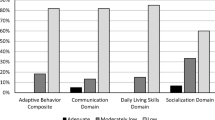Abstract
In this exploratory study we investigated the relationships among family behavior variables (e.g., family expressiveness), adaptive functioning skills, maladaptive behavior, and adherence to treatment in pediatric renal failure patients. The study included 22 pediatric outpatients with renal failure who had not yet received dialysis or transplantation (RF) and their parents, and 12 pediatric outpatients with kidney transplants (TX) and their parents. For the RF patients, significant correlations were found between some of their adaptive functioning skills and measures of their medication adherence, diet adherence, and clinic appointment adherence; however, for the TX patients significant correlations were found only between some of their adaptive functioning skills and measures of their medication adherence. For the RF patients only, some measures of their family behavior were significantly correlated with measures of their medication adherence and diet adherence. Additionally, some measures of the RF patients′ family behavior were significantly related to their communication skills, socialization skills, overall adaptive functioning skills, and maladaptive behavior. For the TX patients, only their socialization skill level was significantly correlated with one measure of their family behavior. It is concluded that facilitation of adaptive and physical functioning among renal pediatric patients likely requires multidimensional training and/or counselling interventions with the children and their families, and that some of the content and/or emphasis of this training likely needs to differ for RF patients versus TX patients.
Similar content being viewed by others
References
Topor M (1981a) Chronic renal disease in children. Nurs Clin North Am 16:587–597
LaGreca AM (1988) Adherence to prescribed medical regimens. In: Routh DK (ed) Handbook of pediatric psychology. The Guilford Press, New York, pp299–320
Khan AU, Herndon CH, Ahmadian SY (1971) Social and emotional adaptations of children with transplanted kidneys and chronic hemodialysis. Am J Psychiatry 127:1194–1198
Korsch BM, Negrete VF, Gardner JE, Weinstock CL, Mercer AS, Grushkin CM, Fine RN (1973) Kidney transplantation in children: Psychosocial follow-up study on child and family. J Pediatr 83:399–408
Korsch BM, Fine RN, Grushkin CM, Negrete VF (1971) Experiences with children and their families during extended hemodialysis and kidney transplantation. Pediatr Clin North Am 18:625–637
Fine RN, Malekzadeh MH, Pennisi AJ, Ettenger RB, Uittenbogaart CH, Negrete VF, Korsch BM (1978) Long-term results of renal transplantation in children. Pediatrics 61:641–650
Garralda ME, Jameson RA, Reynolds JM, Postlewaite RJ (1988) Psychiatric adjustment in children with chronic renal failure. J Child Psychol Psychiatry, 29:79–90
Korsch BM, Fine RN, Negrete VF (1978) Noncompliance in children with renal transplants. Pediatrics 61:872–876
Cederblad M, Helgesson M, Larsson Y, Ludvigsson J (1982) Family structure and diabetes in children. Pediatr Adolescent Endocrinol 10:94–98
Hanson CL, Henggler SW, Harris MA, Burghen GA, Moore M (1989) Family system variables and the health status of adolescents with insulin-dependent diabetes mellitus. Health Psychol 8(2):239–253
Klemp SB, LaGreca AM (1987) Adolescents with IDDM: the role of family cohesion and conflict (Abstract). Diabetes 36:18A
Anderson BJ, Coyne JC (1991) “Miscarried helping” in the families of children and adolescents with chronic diseases. In: Johnson JH, Johnson SB (eds), Advances in child health psychology. University of Florida Press, Gainesville, pp 167–177
Drotar D (1981) Psychological perspectives in chronic childhood illness. J Pediatr Psychol 6:211–228
Patterson J (1985) Critical factors affecting family compliance with home treatment for children with cystic fibrosis. Fam Relations 34:79–89
Schafer L, Glasgow R, McCall K, Dreher M (1983) Adherence to IDDM: relationship to psychosocial variables and metabolic control. Diabetes Care, 6:493–498
Roscoe JM, Smith LF, Williams A, et al (1991) Medical and social outcome in adolescents with end-stage renal failure. Kidney Int 40:948–953
Oyemade U, Rosser P (1980) Development in black children. Adv Behav Pediatr 1:153–179
Yanagida E, Streltzer J (1979) Limitations of psychological tests in a dialysis population. Psychosom Med 41:557–567
Sparrow S, Balla D, Cicchetti D (1984) Vineland Adaptive Behavior Scale Manual. American Guidance Service, Circle Pines, Minn.
Holahan CJ, Moos R (1983) The quality of social support: measures of family and work relationships. Br J Clin Psychol 22:157–162
Navran L (1967) Communication and adjustment in marriage. Fam Process 6: 173–184
Moos RH, Moos BS (1986) Family Environment Scale Manual. Consulting Psychologists Press, Palo Alto
Author information
Authors and Affiliations
Rights and permissions
About this article
Cite this article
Davis, M.C., Tucker, C.M. & Fennell, R.S. Family behavior, adaptation, and treatment adherence of pediatric nephrology patients. Pediatr Nephrol 10, 160–166 (1996). https://doi.org/10.1007/BF00862061
Received:
Revised:
Accepted:
Issue Date:
DOI: https://doi.org/10.1007/BF00862061




